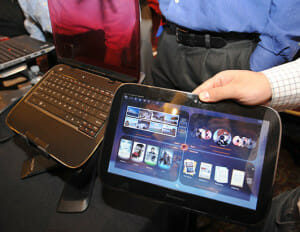
Lenovo's new Ideapad U1 won the top prize for computers at the CES. It combines a tablet form with a traditional laptop. (Robyn Beck/AFP/Getty Images)
As usual we were treated to an hour of Questions & Answers open to anyone brave enough to arrive at 9:00 a.m. on a Saturday morning, before even the coffeepot had finished its business. Pete Masterson, President of BAIPA and author of Book Design and Production, presided over the meeting.
I particularly like the Q&A part of the meeting and never miss it. At this point in my career, I see part of my work as helping new people just coming into independent publishing. The surest way to find out what’s on people’s minds, what they find confusing and where they need guidance, is by listening to the questions they ask.
Of course the questions vary from meeting to meeting, and not all months yield a rich abundance of field-tested intelligence worthy of being gathered. But they are always interesting. Here’s what came up at today’s meeting.
Questions, Questions, Questions
What is the current status of ebook readers?
Pete pointed out that even with the substantial growth of ereaders, they still accounted for only 5% of book sales last year. Many new ereaders are being introduced at the big Consumer Electronics Show going on this week. Some of the problems with preparing books for ereaders include:
- Except for PDF, inability to control fonts or normal page elements
- Creating ePub files from InDesign is still cumbersome
- There’s no easily available tool for directly editing ePub files
- Sony Reader, Barnes & Noble Nook and others use the ePub format, but Amazon’s Kindle uses the MOBI format
- Kindle doesn’t handle graphics well and has very limited fonts
Both Smashwords.com and Scribd.com were discussed as ways to get a book file converted into ereader formats and made available for sale.
And, of course, people are waiting to see whether Apple will enter the ereader or tablet computer market later this month, which could be a game-changer.
Can anyone suggest a printer for a color artbook that costs $40 plus $10 shipping from Lulu.com?
It was pointed out that the only way to get a reasonable price was to print offset, at a considerable up-front cost.
Does an author have liability for satirizing public figures like Monica Lewinsky or Hillary Clinton?
There is usually no problem satirizing politicians, but other public figures are more or less likely to sue. If you have material you are concerned about in your book, you should seriously consider consulting a lawyer before you publish.
Is there any value to attending writer’s conferences?
Writer’s conferences can be an intense learning environment, good especially for those who enjoy networking. There are specialized conferences within each genre that can concentrate on just that niche, like the Society of Travel Writers, and they are a good information resource where you can interact with others in your specialty.
Suggestions were to eat light, drink plenty of fluids and stay off your feet when you can.
Is there a way to turn a blog into a book?
Although there is software now that can automatically convert blogs into PDF documents, it really doesn’t give you anything more than raw material. You still need to go through a complete editorial process to end up with a book that people might want to read. The standards of blog writing are very different from what people expect in books.
What is a blog and where do you get one?
Blogs are websites that are easy to update, and which display the most recent articles added at the top of the page. They are content management systems that may be more effective for authors than static websites. Hosts like Blogger.com and WordPress.com provide free and easy setup of blogs.
Why be independent? Why not just get an agent to do marketing and other tasks?
Agents are primarily concerned with placing books with editors and the contractual details that have to be dealt with in publishing contracts. Agents no longer help with markeing or career development. Publishers are putting the onus for markeint more and more on authors.
Some people have found agents to be unfreindly, and authors with agents have been known to spend whatever advance they get from a publisher on marketing their own book. For many people going independent matches their values and gives them control of their book.
Well, that’s it for this month. Look for my report on the presentation we had at this meeting by E.M. Ginger of 42-Line.com, coming soon.
My question to you: Do you have questions about self-publishing? Confused about the process, the costs, or the best way to move forward? I invite you to post a question in the comments, or email me privately (contact info is on my Hire Me page page) and I’ll do my best to help out.


